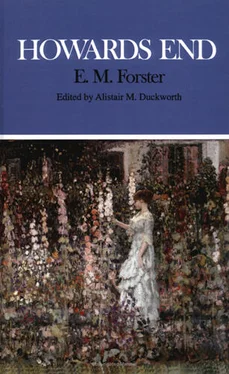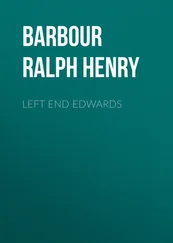Edward Morgan Forster - Howards End
Здесь есть возможность читать онлайн «Edward Morgan Forster - Howards End» весь текст электронной книги совершенно бесплатно (целиком полную версию без сокращений). В некоторых случаях можно слушать аудио, скачать через торрент в формате fb2 и присутствует краткое содержание. Жанр: Классическая проза, на английском языке. Описание произведения, (предисловие) а так же отзывы посетителей доступны на портале библиотеки ЛибКат.
- Название:Howards End
- Автор:
- Жанр:
- Год:неизвестен
- ISBN:нет данных
- Рейтинг книги:3 / 5. Голосов: 1
-
Избранное:Добавить в избранное
- Отзывы:
-
Ваша оценка:
- 60
- 1
- 2
- 3
- 4
- 5
Howards End: краткое содержание, описание и аннотация
Предлагаем к чтению аннотацию, описание, краткое содержание или предисловие (зависит от того, что написал сам автор книги «Howards End»). Если вы не нашли необходимую информацию о книге — напишите в комментариях, мы постараемся отыскать её.
Howards End — читать онлайн бесплатно полную книгу (весь текст) целиком
Ниже представлен текст книги, разбитый по страницам. Система сохранения места последней прочитанной страницы, позволяет с удобством читать онлайн бесплатно книгу «Howards End», без необходимости каждый раз заново искать на чём Вы остановились. Поставьте закладку, и сможете в любой момент перейти на страницу, на которой закончили чтение.
Интервал:
Закладка:
"Exactly what your Mr. Basts won't do."
"Give them a chance. Give them money. Don't dole them out poetry-books and railway-tickets like babies. Give them the wherewithal to buy these things. When your Socialism comes it may be different, and we may think in terms of commodities instead of cash. Till it comes give people cash, for it is the warp of civilization, whatever the woof may be. The imagination ought to play upon money and realize it vividly, for it's the—the second most important thing in the world. It is so sluffed over and hushed up, there is so little clear thinking—oh, political economy, of course, but so few of us think clearly about our own private incomes, and admit that independent thoughts are in nine cases out of ten the result of independent means. Money: give Mr. Bast money, and don't bother about his ideals. He'll pick up those for himself."
She leant back while the more earnest members of the club began to misconstrue her. The female mind, though cruelly practical in daily life, cannot bear to hear ideals belittled in conversation, and Miss Schlegel was asked however she could say such dreadful things, and what it would profit Mr. Bast if he gained the whole world and lost his own soul. She answered, "Nothing, but he would not gain his soul until he had gained a little of the world." Then they said, "No they did not believe it," and she admitted that an overworked clerk may save his soul in the superterrestrial sense, where the effort will be taken for the deed, but she denied that he will ever explore the spiritual resources of this world, will ever know the rarer joys of the body, or attain to clear and passionate intercourse with his fellows. Others had attacked the fabric of Society-Property, Interest, etc.; she only fixed her eyes on a few human beings, to see how, under present conditions, they could be made happier. Doing good to humanity was useless: the many-coloured efforts thereto spreading over the vast area like films and resulting in an universal grey. To do good to one, or, as in this case, to a few, was the utmost she dare hope for.
Between the idealists, and the political economists, Margaret had a bad time. Disagreeing elsewhere, they agreed in disowning her, and in keeping the administration of the millionaire's money in their own hands. The earnest girl brought forward a scheme of "personal supervision and mutual help," the effect of which was to alter poor people until they became exactly like people who were not so poor. The hostess pertinently remarked that she, as eldest son, might surely rank among the millionaire's legatees. Margaret weakly admitted the claim, and another claim was at once set up by Helen, who declared that she had been the millionaire's housemaid for over forty years, overfed and underpaid; was nothing to be done for her, so corpulent and poor? The millionaire then read out her last will and testament, in which she left the whole of her fortune to the Chancellor of the Exchequer. Then she died. The serious parts of the discussion had been of higher merit than the playful—in a men's debate is the reverse more general? —but the meeting broke up hilariously enough, and a dozen happy ladies dispersed to their homes.
Helen and Margaret walked the earnest girl as far as Battersea Bridge Station, arguing copiously all the way. When she had gone they were conscious of an alleviation, and of the great beauty of the evening. They turned back towards Oakley Street. The lamps and the plane-trees, following the line of the embankment, struck a note of dignity that is rare in English cities. The seats, almost deserted, were here and there occupied by gentlefolk in evening dress, who had strolled out from the houses behind to enjoy fresh air and the whisper of the rising tide. There is something continental about Chelsea Embankment. It is an open space used rightly, a blessing more frequent in Germany than here. As Margaret and Helen sat down, the city behind them seemed to be a vast theatre, an opera-house in which some endless trilogy was performing, and they themselves a pair of satisfied subscribers, who did not mind losing a little of the second act.
"Cold?"
"No."
"Tired?"
"Doesn't matter."
The earnest girl's train rumbled away over the bridge.
"I say, Helen—"
"Well?"
"Are we really going to follow up Mr. Bast?"
"I don't know."
"I think we won't."
"As you like."
"It's no good, I think, unless you really mean to know people. The discussion brought that home to me. We got on well enough with him in a spirit of excitement, but think of rational intercourse. We mustn't play at friendship. No, it's no good."
"There's Mrs. Lanoline, too," Helen yawned. "So dull."
"Just so, and possibly worse than dull."
"I should like to know how he got hold of your card."
"But he said—something about a concert and an umbrella—"
"Then did the card see the wife—"
"Helen, come to bed."
"No, just a little longer, it is so beautiful. Tell me; oh yes; did you say money is the warp of the world?"
"Yes."
"Then what's the woof?"
"Very much what one chooses," said Margaret. "It's something that isn't money—one can't say more."
"Walking at night?"
"Probably."
"For Tibby, Oxford?"
"It seems so."
"For you?"
"Now that we have to leave Wickham Place, I begin to think it's that. For Mrs. Wilcox it was certainly Howards End."
One's own name will carry immense distances. Mr. Wilcox, who was sitting with friends many seats away, heard his, rose to his feet, and strolled along towards the speakers.
"It is sad to suppose that places may ever be more important than people," continued Margaret.
"Why, Meg? They're so much nicer generally. I'd rather think of that forester's house in Pomerania than of the fat Herr Fцrstmeister who lived in it."
"I believe we shall come to care about people less and less, Helen. The more people one knows the easier it becomes to replace them. It's one of the curses of London. I quite expect to end my life caring most for a place."
Here Mr. Wilcox reached them. It was several weeks since they had met.
"How do you do?" he cried. "I thought I recognized your voices. Whatever are you both doing down here?"
His tones were protective. He implied that one ought not to sit out on Chelsea Embankment without a male escort. Helen resented this, but Margaret accepted it as part of the good man's equipment.
"What an age it is since I've seen you, Mr. Wilcox. I met Evie in the Tube, though, lately. I hope you have good news of your son."
"Paul?" said Mr. Wilcox, extinguishing his cigarette, and sitting down between them. "Oh, Paul's all right. We had a line from Madeira. He'll be at work again by now."
"Ugh—" said Helen, shuddering from complex causes.
"I beg your pardon?"
"Isn't the climate of Nigeria too horrible?"
"Someone's got to go," he said simply. "England will never keep her trade overseas unless she is prepared to make sacrifices. Unless we get firm in West Africa, Ger—untold complications may follow. Now tell me all your news."
"Oh, we've had a splendid evening," cried Helen, who always woke up at the advent of a visitor. "We belong to a kind of club that reads papers, Margaret and I—all women, but there is a discussion after. This evening it was on how one ought to leave one's money—whether to one's family, or to the poor, and if so how—oh, most interesting."
The man of business smiled. Since his wife's death he had almost doubled his income. He was an important figure at last, a reassuring name on company prospectuses, and life had treated him very well. The world seemed in his grasp as he listened to the River Thames, which still flowed inland from the sea. So wonderful to the girls, it held no mysteries for him. He had helped to shorten its long tidal trough by taking shares in the lock at Teddington, and if he and other capitalists thought good, some day it could be shortened again. With a good dinner inside him and an amiable but academic woman on either flank, he felt that his hands were on all the ropes of life, and that what he did not know could not be worth knowing.
Читать дальшеИнтервал:
Закладка:
Похожие книги на «Howards End»
Представляем Вашему вниманию похожие книги на «Howards End» списком для выбора. Мы отобрали схожую по названию и смыслу литературу в надежде предоставить читателям больше вариантов отыскать новые, интересные, ещё непрочитанные произведения.
Обсуждение, отзывы о книге «Howards End» и просто собственные мнения читателей. Оставьте ваши комментарии, напишите, что Вы думаете о произведении, его смысле или главных героях. Укажите что конкретно понравилось, а что нет, и почему Вы так считаете.












